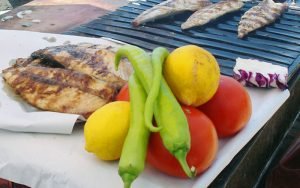This post may contain Amazon® product affiliate links. We may receive a commision if you make a purchase after clicking on one of these links but at no cost to you. Please visit Our Disclosure Page for more information. Thank you.
The paleo diet for athletes is designed for endurance athletes and is comprised of optimal foods and excludes such foods as whole grains and dairy. This version will slightly bend the rules when it comes to following the traditional paleo diet, because an athlete is placing more demands on their body. Serious athletes need food for energy and quick recovery. This can require consuming a limited amount of non-optimal foods.
How This Can Help to Boost The Performance of Athletes
 It’s recommended that athletes consume low glycemic index carbs two hours prior to a workout. The meal should be low in fiber and contain healthy fat and lean protein. The athlete will need to consume two to three-hundred calories each hour until their workout or race begins. If eating two hours prior to a workout isn’t possible, try to consume approximately two-hundred calories ten to fifteen minutes before you workout.
It’s recommended that athletes consume low glycemic index carbs two hours prior to a workout. The meal should be low in fiber and contain healthy fat and lean protein. The athlete will need to consume two to three-hundred calories each hour until their workout or race begins. If eating two hours prior to a workout isn’t possible, try to consume approximately two-hundred calories ten to fifteen minutes before you workout.
During an intense workout or race, you’ll need to take in high glycemic index carbs, and this can be done mostly in the form of liquids. Use a sports drink for this.
During the first half an hour after a workout you’ll need to use a recovery drink that contains protein and carbs. This thirty minute window is critical for muscle recovery.
During the next few hours following a workout you’ll be able to eat foods that are considered non-optimal, such as bread, pasta and rice. These foods are rich in glucose and are necessary for the muscle recovery process.
During the rest of the day you’ll need to stick to the strict rules of the paleo diet. Which means no processed foods, whole grains, soda, refined sugar, white flour, dairy products or caffeine.
This mutated paleo diet is designed to improve an athlete’s health for the long term and it’s high in trace nutrients, which are necessary for muscle recovery and optimal health.
How to Start this Diet
 Your dietary needs will be highly dependent on your current weight, training program and fitness goals. Before you make any major changes to your diet or training it’s recommended that you meet with a nutritionist. A nutritionist can customize a meal plan to suit your needs, based on your weight, height, how active you are and how many calories you burn during a workout. Personal trainers may also be helpful and can offer tips on when to increase your carb intake, good pre and post workout drinks and what to eat for fueling up. You will experience results from this dietary change immediately. You’ll notice a boost in energy and reduction in bloating and inflammation and faster recovery time after a workout.
Your dietary needs will be highly dependent on your current weight, training program and fitness goals. Before you make any major changes to your diet or training it’s recommended that you meet with a nutritionist. A nutritionist can customize a meal plan to suit your needs, based on your weight, height, how active you are and how many calories you burn during a workout. Personal trainers may also be helpful and can offer tips on when to increase your carb intake, good pre and post workout drinks and what to eat for fueling up. You will experience results from this dietary change immediately. You’ll notice a boost in energy and reduction in bloating and inflammation and faster recovery time after a workout.
